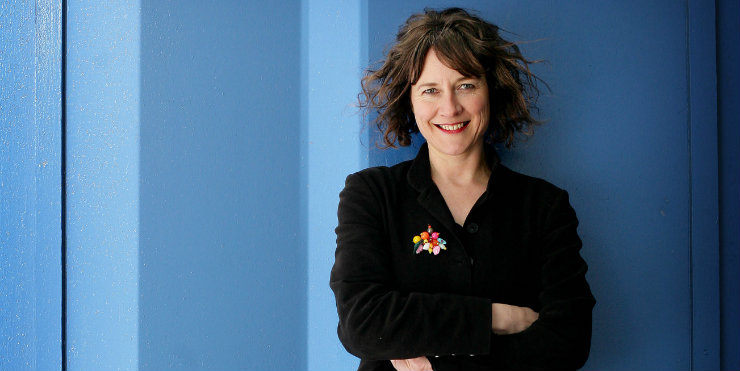
Jill Dawson. Image © Tim Allen
Jill Dawson grew up in Yorkshire. She has held many Fellowships, including the Creative Writing Fellowship at the University of East Anglia, where she taught on the MA in Creative Writing course. In 2006 she received an honorary doctorate in recognition of her work.
Jill’s novels include Fred and Edie, which was shortlisted for the Whitbread Novel Award and the Orange Prize, Watch Me Disappear, which was longlisted for the Orange Prize, and The Great Lover, a Richard and Judy Summer Read in 2009. She has also edited six anthologies of short stories and poetry.
Jill’s 2016 book, The Crime Writer, is set in 1960s Suffolk and won the East Anglian fiction prize and East Anglian overall Book of the Year. Her new book, The Language of Birds, draws on the Lord Lucan murder case of 1974. You can see her in person at Slaughter in Southwold in June.
1. Who were your literary heroes and influences as you were growing up?
I read Enid Blyton. The Famous Five and Secret Seven. I loved Pollyanna, by Eleanor H. Porter and Little House on the Prairie, by Laura Ingalls Wilder, which is funny because in my twenties I lived in a log cabin in North America for a while (my ex still lives in the cabin we bought, and it still doesn’t have running water…).
2. Many Suffolk readers will know your work from The Crime Writer, which was based here. Patricia Highsmith was a complex character. What drew you to her, and how bound did you feel by what we already know about her?
I was so surprised to discover she lived in Earl Soham and Aldeburgh. It seemed incongruous somehow for such a tough, independent character to try to hide in the English countryside and conduct a secret affair with a married woman. Her friendship with the writer Ronald Blythe surprised me too.
I always feel that I should follow the ‘logic of emotion’ when I write a novel based on a real story. I do a lot of research - much more than I need, usually - and write to show what I’ve found, not what I was looking for.
3. Your new book, The Language of Birds, draws on the infamous Lord Lucan affair, but you have centred it around the victim Mandy?
Yes. The Language of Birds tells the story of two young women (birds!), Mandy and Rosemary from the Fens, who go to London in the ’70s to work as nannies to aristocratic families. They hope for adventure and fun and perhaps romance, but Mandy has landed in a family which is imploding - the husband and wife locked in a bitter custody battle.
Lord Lucan’s disappearance in 1974, after a murdered nanny was found in his home, is well known and has been much documented. At the inquest in which he was found guilty of the murder of Sandra Rivett, her aunt commented: “This whole inquest has been about him, and the life of our Sandra has been forgotten.” I hoped to remedy that.
4. Has a book ever changed your life or made you think differently?
Many times! That’s what books should do, surely?
Akenfield, by Ronald Blythe, which I read aged sixteen, had a huge impact and influenced me all those years later in The Crime Writer… or the poetry of Ted Hughes. I am included in an anthology that has just come out edited by Kit de Waal and called Common People. and my essay is about how much I loved Hughes’ poem ‘Thought Fox’, and how a visit from him to our school made me want to be a writer.
5. How did your Gold Dust mentoring scheme come about, and how was your own path to publication?
Gold Dust pairs up new writers with established ones, who work with them with their novels. We’ve had loads of successes, including currently having three of our graduates on the Lucy Cavendish fiction prize longlist, and one of my students, Rosalind Stopps, is just about to publish her own first novel, Hello, My Name is May, at the age of 62.
My own path was simple: I began sending work to publishers from a very early age (and got many rejections). I compiled six anthologies of poetry and short stories for Virago and The Women’s Press before I got an agent. It was a great way to learn the ropes of publishing and meant that I have always been good at meeting a deadline!
6. Do you have a message for your Suffolk library readers?
Well I do obviously hope they enjoy my new novel based around the Lord Lucan flight from justice and set partly in the Cambridgeshire Fens. Also, the audio version.
7. Can you tell us one thing your readers may not know about you?
I’m a fully qualified Yoga teacher! I don’t teach any more and haven’t for a long time. But I do some Yoga every morning and am pretty bendy as a result, like a comic character I remember: Twangy Pearl the Elastic Girl.
